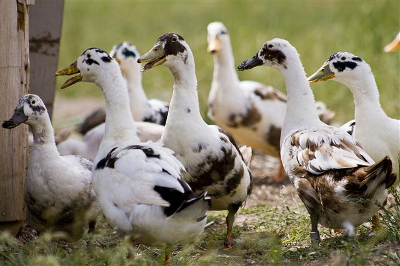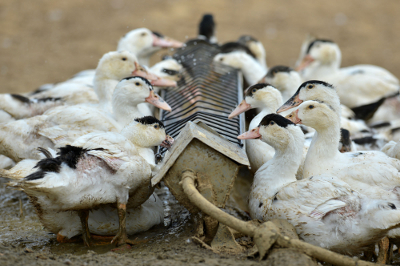
Deppe on ducks
 My favorite part of The Resilient Gardener,
by far, was Deppe's chapter on ducks. She keeps her ducks the way
we keep our chickens --- on pasture as part of a diverse
homestead. By the time you read her duck chapter, you'll want some
waterfowl too.
My favorite part of The Resilient Gardener,
by far, was Deppe's chapter on ducks. She keeps her ducks the way
we keep our chickens --- on pasture as part of a diverse
homestead. By the time you read her duck chapter, you'll want some
waterfowl too.
Why the focus on
ducks? Deppe considers ducks to be the perfect livestock for the
Pacific Northwest, and sings their praises in great depth. She
believes ducks forage better than chickens, lay better at an older age
and in the winter, are easier to keep out of the garden with two-foot
fences, and are happy even during cold, wet winters. On the other
hand, Deppe warns that ducks aren't for everyone. Ducks are more
vulnerable to predators than chickens are, the ducklings cost more and
usually can't be sexed at hatching, they need water to dabble in, they
don't do well in confinement and can't live in tractors, they can't
stand frozen winters, and they require more coop space since they roost
on the ground. But if you have a larger homestead with plenty of
room for the ducks to forage, Deppe believes ducks are the way to go.
I won't go into depth
about Deppe's duck advice since you'll really want to read the whole
chapter if you're interested in following her lead. However, I did
want to end with a few of her tips on making duck-care more
sustainable. During the proper seasons, Deppe feeds her ducks
cooked potatoes and winter squash, the former of which cuts feed costs
by 67% if ducks are also given lots of space to forage.
(Winter squash is lower in protein, so Deppe finds that addition doesn't
cut feed costs nearly as much.) Deppe's ducks get the cull squash
 that are small or were harvested not quite ripe, and the ducks seem to enjoy Delicata and Sweet Meat especially.
that are small or were harvested not quite ripe, and the ducks seem to enjoy Delicata and Sweet Meat especially.
Another hint Deppe gave
for making your ducks homestead-worthy pertains to ducklings. She
notes that if you let ducklings swim in warm water during their first
few days of life (carefully drying them in their brooder afterwards),
the activity turns on the ducklings' wax glands so they quickly become
waterproofed and able to forage in damp conditions. On the other
hand, if you skip that early swim, the wax glands won't activate until
the ducks are eight weeks old, and you'll have to baby your ducklings
that whole time so they don't get wet and chilled.
I love how passionate
Deppe is on the subject of ducks, but Mark and I are equally passionate
about chickens. So even though we're trying ducks this spring on
her advice, we'll be keeping careful records of which type of bird does
best on our homestead. Stay tuned for lots of number crunching
(and cute photos) all season!
| This post is part of our The Resilient Gardener lunchtime series.
Read all of the entries: |
Want more in-depth information? Browse through our books.
Or explore more posts by date or by subject.
About us: Anna Hess and Mark Hamilton spent over a decade living self-sufficiently in the mountains of Virginia before moving north to start over from scratch in the foothills of Ohio. They've experimented with permaculture, no-till gardening, trailersteading, home-based microbusinesses and much more, writing about their adventures in both blogs and books.
Want to be notified when new comments are posted on this page? Click on the RSS button after you add a comment to subscribe to the comment feed, or simply check the box beside "email replies to me" while writing your comment.

Anonymous --- Carol Deppe made two excellent points in favor of this breed (which is her favorite). First, Anconas are equivalent to a dual-purpose chicken, so the males have enough meat on their bones to be worth slaughtering, while Campbells are more like hybrid egg-layers (scrawny). Second, Anconas are much less skittish than the major egg-laying breeds, which seemed like a plus since Leghorns have taught us that extremely skittish fowl are no fun.
It also looks like Anconas aren't really much worse egg-layers than the average Khaki Campbell. Anconas are reported to lay 210 to 280 eggs per year, and unless you find high-production strains of Khaki Campbells, those tend to average about 240 eggs per year.
This post has some more useful duck-choosing advice. Although we ended up ordering from Cackle Hatchery because Murray McMurray wanted to charge us an exorbitant amount of shipping since ducks and chicks ship from different facilities for them.
One other drawback of ducks vs chickens is that ducks take more effort to process after slaughtering. They're harder to get a good scald (because the oil/wax and feathers are designed to keep the water away from their skin!), harder to pluck, and give less meat than good dual-purpose chicken breeds. Some people love duck meat, and that makes up for the extra effort, but I find chicken equally tasty and less finicky to cook.
That said, we do still keep a few ducks for eggs. And because we breed them to replenish the flock, there's always a few we have to cull every year, so we do end up eating them.